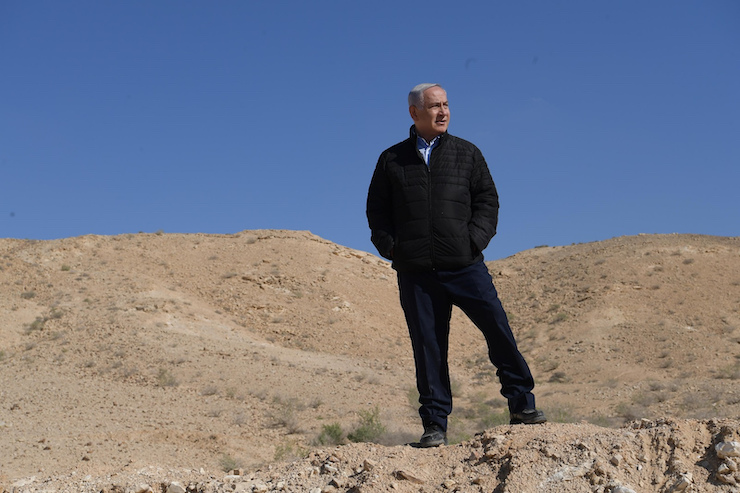Four years ago, the prospect of another Netanyahu government meant perpetuating the status quo. This time, the opposition is offering the status quo — and Netanyahu something far worse.

The short distance between resignation and despair is the difference between knowing that things aren’t going to get any better and the fear that they could very easily get worse and there’s nothing to do about it. In many ways, that feels like the theme of the upcoming Israeli elections — at least for the small minority of Israelis whose political identity and priorities are wrapped up in the fights to end the occupation and seek an equitable society.
Four years ago, the last time Israelis went to the polls, I wrote that the only thing that could have possibly defeated Benjamin Netanyahu was hope and vision: hope for change, vision of a better future, anything really. Nobody was offering such a vision. And absent an alternative worth taking a risk for, there was nothing more reasonable for Israelis to do than to choose more of the same — stability.
This time around, things seem far bleaker. Without any vision of their own, Netanyahu’s main challengers have adopted a platform that is basically just a more palatable version of the status quo. Continued occupation. No lifting the siege on Gaza. More collective punishment and oppressive policies. No push to resolve the conflict. A Benny Gantz-led Israel would merely make the current discriminatory and undemocratic reality prettier, thereby reducing any international pressure to change course.
The only discernible difference between the current administration and the “Blue and White” alternative is a few less radical right-wingers in the government, and an ostensibly less corrupt prime minister. In other words, this time around it’s the challengers who are offering the status quo as their vision — resignation.

Netanyahu, meanwhile, is taking huge strides to the right, leaping over lines many thought even he would not cross. Faced with corruption charges and a cadre of generals vying to replace him, the prime minister has paved a political future for himself that, if he is tasked with forming a fourth consecutive government, could set Israel-Palestine on a path far worse than anything we’ve seen in decades.
In the nearly 10 years that Netanyahu has consecutively occupied the Prime Minister’s Office, each of his governments — and the accompanying political climate — have been more nationalist and right-wing than the one that preceded. The Israeli right’s wish list of laws, policies, and actions has slowly but steadily moved from the drawing board to the law books to the real world.
Laws were passed to limit speech that challenges Zionist narratives, to restrain and harass human rights and anti-occupation groups, to keep critics out of the country, to legalize the theft of Palestinian land, to delegitimize even the most nonviolent acts of Palestinian resistance. This government ordered the army to open fire on thousands of protesters in Gaza. It decided to steal millions of dollars from the Palestinian Authority, stripped Arabic of its status as an official language in Israel, put in place a plan to displace tens of thousands of Bedouin citizens of Israel, and stripped hundreds of Bedouin of their citizenship. The Netanyahu government made friends with world leaders flirting with bona fide anti-Semitism, and in the same breath, convinced the world that criticizing Israeli policies and political ideology is the real anti-Semitism.

The ideological undercurrents that drove all of those policies and legislative decisions will only be reinforced, emboldened, and untethered if Benjamin Netanyahu forms his next government with the most extremist lineup of right-wing parties he has ever assembled. Which is to say, further to the right than the current collection of racists and supremacists he surrounded himself with.
For the sake of reference: the current Israeli government includes a deputy minister who called Palestinians sub-humans, a minister who threatened Palestinians with a “third Nakba,” ministers who tried to shut down foreign news outlets for being too critical and have shut down Palestinian networks just for existing. The current government includes a minister who compared asylum seekers to cancer, and who once in office publicly embraced crowds belting out genocidal chants. Senior officials regularly call for and implement collective punishment against Palestinians and others, the ruling Likud party has embraced annexation as a policy goal, and numerous ministers have used the demolition of entire Palestinian villages to gain political points. Netanyahu himself has accused his critics of being traitors, warned that nearly a quarter of Israeli citizens’ votes are a threat to the country, and stated more times than I can count that he will never, ever, end the occupation.
And all of that was without the openly Jewish supremacist Kahanist party, “Jewish Power,” to whose ideas Netanyahu will be beholden if he needs them to form a government, something to which he’s already admitted will be the case.
At that point, it wouldn’t take much to remove the constraints that have held back the flood waters so far. The next government will not have a Moshe Kahlon powerful enough to block a change to Israel’s non-constitution giving the Knesset the power to override the Supreme Court, as Ayelet Shaked and much of the Likud desperately want. It wouldn’t take much to change the role of Israel’s attorney general such that he is no longer positioned to stand in the way of the most egregious, oppressive, unjust, and discriminatory policies. It won’t take much more domestic pressure before the threat of international blow-back is no longer enough to stop the annexation train from leaving the station. And in the Trump era, particularly with the backing of European leaders like Victor Orban, the threat of international pressure is nowhere on the horizon.

Analysts have been warning for years that the status quo of occupation is unsustainable. Those alarms were usually sounded to increase the perceived urgency of reaching a two-state solution and ending Israel’s undemocratic military rule over millions of Palestinians. But the danger here is far greater than simply issuing a death certificate for the two-state solution.
The real danger lies in what an empowered right-wing Israeli government, having proven to its people that a negotiated peace isn’t an option, is willing to try in its stead. The real danger is what a government, whose power is reliant on parties with ideologies that call for expelling Palestinians, will do the next time it has an opportunity to fundamentally change the status quo. The real danger is how far a hyper-nationalist government that has already shown its desire to silence dissent will go in that pursuit.
As political despair has come to envelope the anti-occupation camp in recent years, particularly in the Trump era, I’ve often drawn hope from the knowledge that some of the biggest changes in the world, like the fall of Apartheid and the Berlin Wall, came with little, if any, warning. Nowadays, that same knowledge has become a source of fear.

